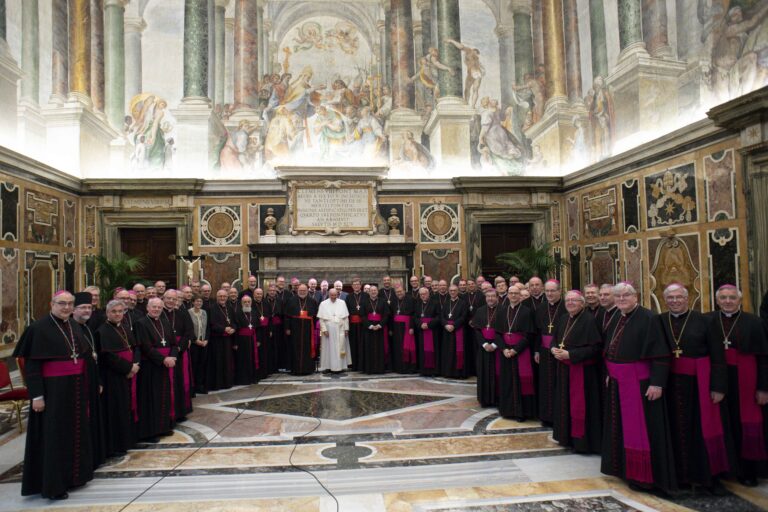Several German Catholic bishops voiced their expectations of the World Synod at the autumn plenary assembly of the German Bishops’ Conference in Wiesbaden on Wednesday.
Bishop Bertram Meier of Augsburg said he saw the meeting, which begins next Wednesday in Rome, as a “spiritual experiment”. Speaking to journalists, Meier compared it to experiments in the chemistry lab: these could “lead to completely new solutions, but also to explosions”.
Clashed
Sometimes it could be good when different positions clashed and “the cards are laid on the table”, he added. At the same time, Meier dampened hopes for quick solutions. “It must fill us with concern to experience when differences of all kinds are perceived as insurmountable opposites,” he said.
He said he hoped that the culture of dialogue at the Roman Synod would follow the line of mutual respect. “I appreciate the diversity in our Church and very much hope that it will not be understood as a threat to unity, but as mutual enrichment.”
The bishop of Essen, Franz-Josef Overbeck, reiterated that the Church in Germany did not intend to go its own way with the Synodal Path reform process. “I am convinced that we are not going down an isolated special path, but that we are firmly anchored in Church doctrine with it,” he said in Wiesbaden.
Big issues
However, the “big issues” of the Synodal Path must be addressed at the World Synod “from the role of women to the question of sexuality” which was about “people who love each other”.
For synodality to succeed, an open culture of discussion and conflict was necessary, the bishop said. “The synodal members in Germany have experienced first-hand, so to speak, how strenuous it is to listen and no less strenuous to agree on differences and decisions together,” Overbeck said. The Church in Germany therefore hoped to be able to “contribute productive aspects to the synodal path of the Universal Church”.
By contrast, Bishop Stefan Oster of Passau said he did not see the German reform process as a good model for the World Synod in Rome. The German Synodal Path had led to more antagonism “between the Church in Germany and Rome, among us bishops and among the people of God”, Oster said.
Different
The Pope wanted something different for the World Synod. It should not be “characterised by political processes, strategic action and the clear use of public pressure”, Oster said. Instead, its achievements should include an answer to the question of “why do we so rarely succeed in inviting people to have faith in the gospel while at the same time hundreds of thousands are turning their backs on the Church?”
Meier, Overbeck and Oster, as well as the president of the German Bishops’ Conference, Georg Baetzing, and Muenster Bishop Felix Genn will take part in the World Synod in Rome from October 4 to 29. The Synod aims to discuss a kind of new constitution for the Church which gives members a greater say.
Women and laypeople
For the first time, women and laypeople will also be allowed to vote in Rome. At the end of the process the Pope will decide on the resolutions of the Synod. In Wiesbaden, Baetzing demanded that the Pope should – also through the Synod’s statues – commit himself more strongly to “what he hears and what happens in a Synod”.
Earlier, the Bochum theologian Thomas Soeding had expressed the hope that the two-part Synodal Assembly in autumn this year and next year would deliver concrete results on more diversity in the Catholic Church.
Centralism in the Church must be reduced in order to allow for differences between continents and cultures while maintaining cohesion, he said in an interview with the newspapers of the Bistumspresse publishing group.
Invited
“We all want to be 100 percent Catholic, but in a way that fits the culture of the country or continent,” said Soeding, who teaches biblical studies at the University of Bochum. He has been invited by the Vatican as a consulting expert to the General Assembly of the Synod in Rome.
At the same time, Soeding praised the worldwide preparation for the Synod. “What other global organisation manages to agree on such a statement addressing problems? The United Nations, for example, does not.”
Originally reported by KNA Germany.



